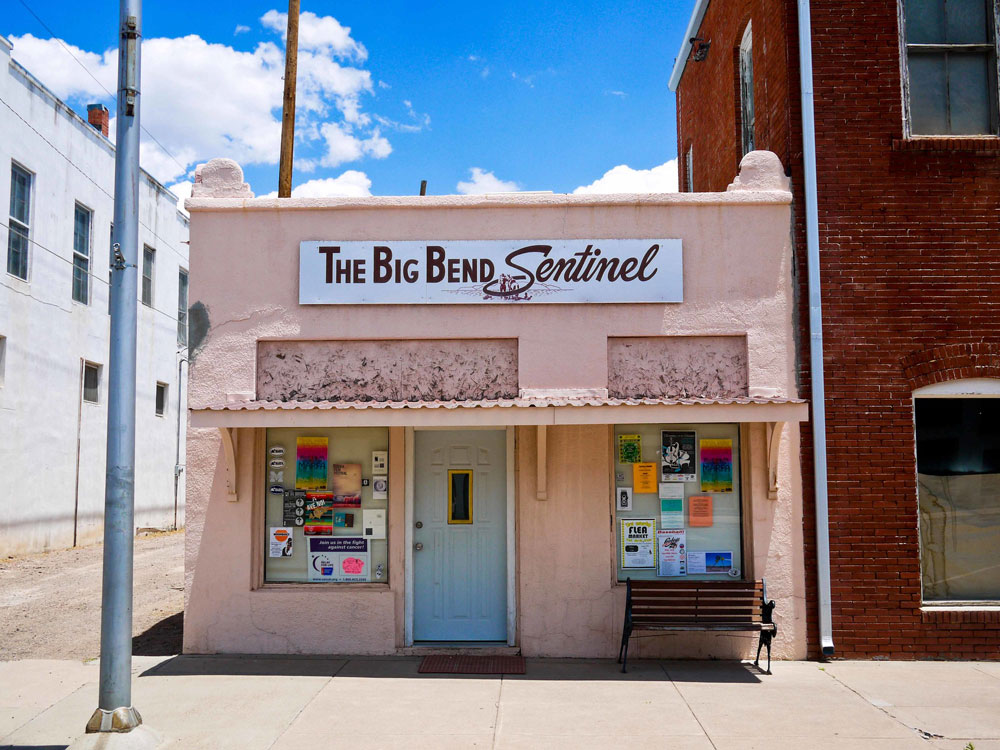
February 20, 2020; New York Times
When NPQ wrote about the potential in local newspapers becoming nonprofits, the story was about investment in the strong leadership and community buy-in this kind of local journalism requires. That story had its roots in Texas, and again, Texas has presented us with another option for local journalism—this time, a for-profit option that’s truly out-of-the-box and reminds us of the course that small independent bookstores have taken against a chorus of voices declaring them dead.
In the small town of Marfa, Texas, you will find the Big Bend Sentinel operating in the back of a busy café and cocktail bar. It is not just hyperbole to say that the lights are always on at the Sentinel!
According to a 2018 study by the Hussman School of Media and Journalism at the University of North Carolina, since 2004, nearly 20 percent of local newspapers in the US have folded, merged, or been replaced by a network of investment groups. For feisty independents like the Sentinel, that would never do. They had always been able to scrape by on a combination of ad sales and subscriptions. And they covered both local and national news that happened nearby, like the controversial border wall 60 miles away.
The arrival of Maisie Crow and Max Kabat from New York, who bought the Sentinel from the paper’s publishers of the past 25 years, brought change, and not in a small way. Neither Crow nor Kabat are journalists or publishers; Kabat’s a consultant and Crow’s a documentary filmmaker. Their goal is to maintain this community paper and “expand its potential,” according to Crow.
And so, the idea of combining the paper with a local venue (they were not sure just what in the beginning) was born. The site was a former dive bar that had previously been a funeral home. They finally decided on the café/bar concept; locals could work, and tourists could drop in and get the flavor of the community (and read the paper).
Sign up for our free newsletters
Subscribe to NPQ's newsletters to have our top stories delivered directly to your inbox.
By signing up, you agree to our privacy policy and terms of use, and to receive messages from NPQ and our partners.
The kitchen space is rented to local cooks who serve food during the day. Crow and Kabat make no money on the food, but they do make profits on the drinks. And they now get requests to rent the space for private events.
Next to the Sentinel café/bar is the Big Bend Sentinel in a much smaller space than the gathering place that shares its name. But coffee for its two full-time reporters is never far away. And the red neon sign that says “newspaper” glares in that limited space to remind them of their mission. Reporters can work out of space in the Sentinel (where coffee and food are even closer), which put them in even closer proximity to local news.
“It’s a great way to keep my finger on the pulse and get new leads and find stories,” said Abbie Perrault, the managing editor.
Crow and Kabat are keeping the two businesses separate on paper, although they operate from the same building. It makes sense for legal reasons as in Texas, any business with an Alcohol Beverage Commission license for serving alcohol is subject to warrantless searches. They did not want to take that risk with the newsroom. They also turned down a political candidate who wanted to rent the Sentinel space. They saw that as crossing the line for the ethics of the paper.
Since buying the paper, Crow and Kabat have grown the newspaper’s digital footprint by seven percent. They have increased its photographic coverage and added a crossword puzzle and Sudoku. They also own the Sentinel’s sister publication, the International, which is now totally translated into Spanish, as it serves the largely Spanish-speaking neighboring border town of Presidio. The Independent also has added the crossword puzzle and Sudoku.
Ad sales still are the major revenue source for the Big Bend Sentinel. But with income from events and drink sales, there has been no increase in annual subscription costs for local subscribers. Perhaps when Marfa locals frequent the Sentinel for coffee, food, or cocktails, or attend a wedding or party there, they will know that they are contributing to something more. It’s yet another way journalists and local newspapers can become rooted in the structures (physically and psychologically) of their communities. Will it work in the long run? That’s anyone’s guess.—Carole Levine













